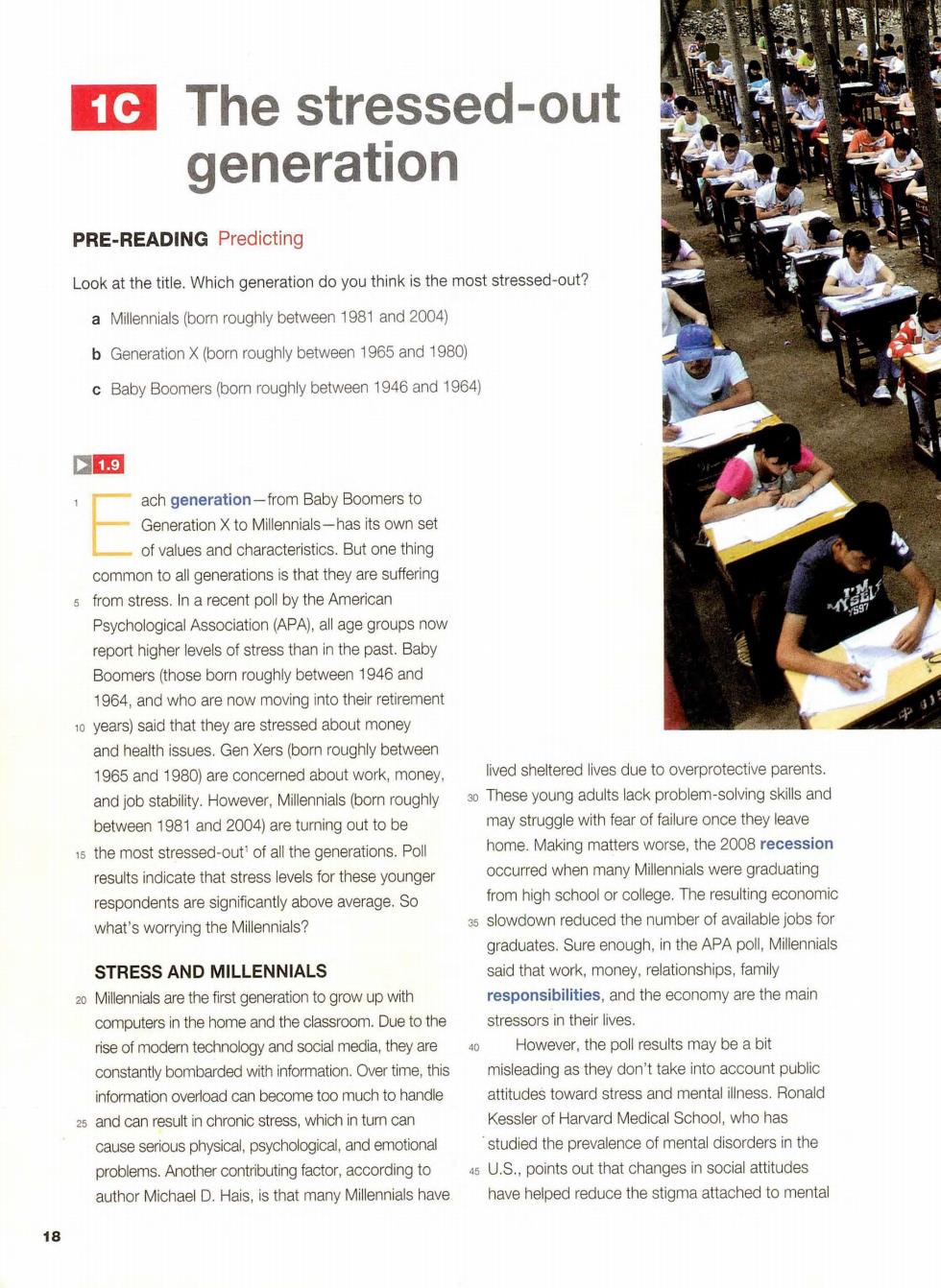正在加载图片...

1C The stressed-out generation PRE-READING Predicting Look at the title.Which generation do you think is the most stressed-out? a Millennials (bom roughly between 1981 and 2004) b Generation X (born roughly between 1965 and 1980) c Baby Boomers (bom roughly between 1946 and 1964) 1.g ach generation-from Baby Boomers to Generation X to Millennials-has its own set of values and characteristics.But one thing commn to all generations is that they are suffering s from stress.In a recent poll by the American Psychological Association(APA).all age groups now report higher levels of stress than n the past.Baby Boomers(those bomn roughly between 1946 and 1964.and who are now moving into their retirement years)said that they are stressed about money and health issues.Gen Xers(bor roughly between 1965 and 1980)are concerned about work,money lived sheltered lives due to overprotective parents and iob stability.However.Millennials (bom roughly These young adults lack problem-soving skills and 200)are tumning out to be may struggle with fear of failure once they leave s the most stressed-out'of all the generations.Poll home.Making matters worse.the 2008 recession results indicate that stress levels for these younger occurred when many Milennials were graduating respondents are significantly above average.So from high school or college.The resulting economic what's womrying the Millennials? slowdown reduced the number of available jobs for graduates.Sure enough,in the APA poll,Millennials STRESS AND MILLENNIALS said that work,money,relationships,family 2o Millennials are the first generation to grow up with responsibilities,and the economy are the main computers in the home and the class om.Due to the stressors in their lives. nise of modem technology and social media,they are However.the poll results may be a bit constantly bombarded with information.Over time,this misleading as they don't take into account public information overload can become too much to handle attitudes toward stress and mental illness.Ronald and can result in chronic stress,which in tum can Kessler of Harvard Medical School.who has cause serious physical,psychological,and emotiona studied the in the problems.Another contributing factor,according to 4sU.S..points out that changes in social attitudes author Michael D.Hais,is that many Millennials have have helped reduce the stigma attached to mental 18 1C -OU • enera 10n PRE-READING Predicting Look at the title. Which generation do you think is the most stressed-out? a Millennials (born roughly between 1981 and 2004) b Generation X (born roughly between 1965 and 1980) c Baby Boomers (born roughly between 1946 and 1964) 1 ach generation -from Baby Boomers to Generation X to Millennials-has its own set of values and characteristics. But one thing common to all generations is that they are suffering s from stress. In a recent poll by the American Psychological Association (APA), all age groups now report higher levels of stress than in the past. Baby Boomers (those born roughly between 1946 and 1964, and who are now moving into their retirement ,o years) said that they are stressed about money and health issues. Gen Xers (born roughly between 1965 and 1980) are concerned about work, money, and job stability. However, Millennials (born roughly between 1981 and 2004) are turning out to be 1s the most stressed-out1 of all the generations. Poll results indicate that stress levels for these younger respondents are significantly above average. So what's worrying the Millennials? STRESS AND MILLENNIALS 20 Millennials are the first generation to grow up with lived sheltered lives due to overprotective parents. 30 These young adults lack problem-solving skills and may struggle with fear of failure once they leave l1ome. Making matters worse, the 2008 recession occurred when many Millennials were graduating from high school or college. The resulting economic 35 slowdown reduced the number of available jobs for graduates. Sure enough, in the APA poll, Millennials said that work, money, relationships, family responsibilities, and the economy are the main computers in the home and the classroom. Due to the stressors in their lives. rise of modern technology and social media, they are 40 However, the poll results may be a bit constantly bombarded with information. Over time, this information overload can become too much to handle 2s and can result in chronic stress, which in turn can cause serious physical, psychological, and emotional proble1T1s. Another contributing factor, according to author Michael D. Hais, is that many Millennials have misleading as they don't take into account public attitudes toward stress and mental illness. Ronald Kessler of Harvard Medical School, who has • studied the prevalence of mental disorders in the 45 U.S., points out that changes in social attitudes have helped reduce the stigma attached to mental